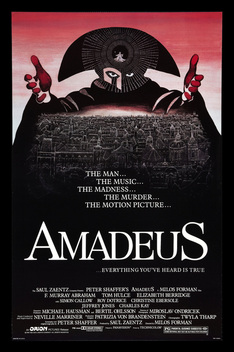
Before I continue, I’m going do this:
SPOILER WARNING!! GO WATCH THIS FILM BEFORE CONTINUING!!
When talking about the work of Orson Welles, someone once said that talent finds easy that which a normal person would find difficult, and that genius (in this case Welles) finds easy that which a talented person would find difficult. Aside from being a long way of paraphrasing Schopenhauer, it does rather successfully light upon the distinction between the capabilities of those with talent and those with something more. It must be a hell of a thing to be talented, capable and accomplished, to have the world within your grasp, only to be robbed at the last by the grubby hands of someone blessed with something you know you will probably never be capable of… which brings us to the film Amadeus.

F. Murray Abraham won his Academy Award for his performance as composer Salieri, and it really is an incredible performance. When faced with the music of Mozart, Salieri is a torrent of conflicted emotion, which Abraham carries off beautifully. One of the genuine joys of Amadeus is seeing Abraham convey the sadness, the triumph, the rapture of Mozart’s music as he reads his compositions. In the late 1700s, when Mozart plied his trade, his was music that never been heard before on any level, and Abraham expresses every inch the shock to Salieri’s system. He not only can see the obvious beauty of the work, but feels a personal anguish in knowing that such magnificence is beyond him. That his own talent is now dimmed when resting next to Mozart. And so the solution would seem the only one.

Setting the scene: Having decided to murder Mozart, Salieri decides on the perfect way to not only remove his rival, but how he will take his rightful place in the music world once more. To the young priest now taking his confession, the old composer rapturously describes how he expects his plan to end, and how the world will finally take notice of him at the time of his supposed friend’s death…

 RSS Feed
RSS Feed
